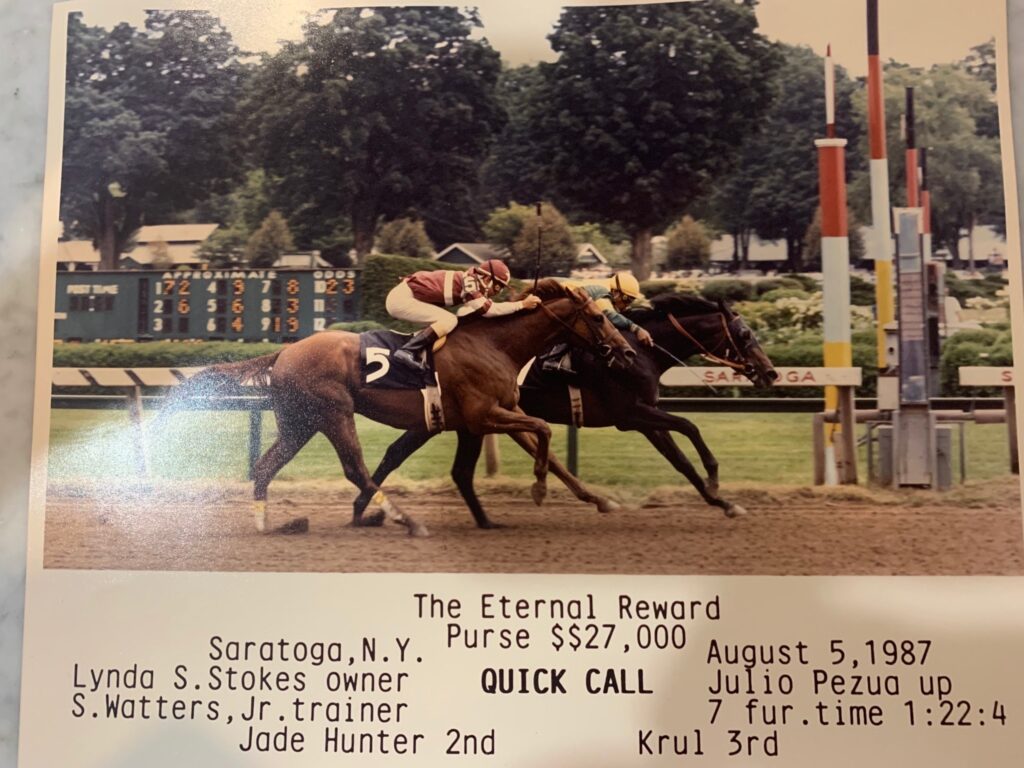By Francis LaBelle

Sydney Watters Jr. was well on his way to the Hall of Fame when Quick Call ran his first race in 1986. After serving as an aerial gunner in World War II, Watters returned home to become a noted steeplechase trainer and won or shared six titles for the most victories from 1948 to 1973. He saddled the steeplechase champions Amber Diver and Shadow Brook and led in earnings among trainers three times. That resume alone got him inducted into the Hall of Fame in 2005.
Watters, however, further padded his credentials by training two champions on the flat: 1970 juvenile champion Hoist the Flag and Slew o’Gold, 1983’s three-year-old champion.
And then there was Quick Call.
Debuting with a seventh-place finish behind victorious Java Gold at Belmont Park on June 23 that year, Quick Call came back a winner at Belmont, where he broke his maiden in the mud on July 12.
Quick Call immediately fell in with a tough crowd.
In his next three starts, he faced Gulch, Polish Navy and Java Gold. Gulch would lose only one race as a two-year-old and would go on to be a two-time winner of the Metropolitan Handicap and the 1988 Breeders’ Cup Sprint. Polish Navy would win the Champagne and Cowdin Stakes in ’86 and the Woodward and Saratoga’s Jim Dandy in ’87. Java Gold would win three Grade 1 races in 1987: the Whitney and Travers at Saratoga and Belmont’s Marlboro Cup Invitational.
Quick Call’s two-year-old season ended with a distant fifth to Java Gold on September 11, 1986.
“Quick Call was a good-looking horse, well built, but he didn’t turn heads right away,” said Kenneth Crookes, who had joined Watters’ stable in 1977 at Saratoga as a hotwalker and would eventually become assistant trainer. “We had a lot of good two-year-olds in the barn, and you can see that Quick Call was racing against some pretty tough horses.”
Quick Call did not win another race until July 9, 1987, nine races after his first victory.
“All the horses in Mr. Watters’ stable were trained with the idea of racing at the Belmont Spring Meet, Saratoga and then back to Belmont for the Fall Championship Meet,” Crookes said. “The winter meet (at Aqueduct) was an afterthought, unless an owner decided not to send one of his or her horses home.
“Mr. Watters liked to keep his horses busy. He fed them hay, oats and water and kept them happy. Christine Clayton was his exercise rider, and she was a very important reason why Quick Call did so well. She rode him every day, and she made sure he was happy.”
On August 5, 1987, Quick Call made his second start at Saratoga. Just over a year before, he was drubbed by Gulch in his Spa debut.
He carried jockey Julio Pezua to a neck victory in that seven-furlong race, defeating eventual multiple Grade 1 winner Jade Hunter, who would later sire 2002 Horse of the Year, Azeri. Five days later, Quick Call caught a sloppy track and defeated a field that included 1986 two-year-old champion and Breeders’ Cup Juvenile winner, Capote.
Quick Call’s two-race win streak was halted by Templar Hill, but he came back to score his third Saratoga victory of the season on August 30.
“People forget that, in those days, Saratoga only had a 21-day meeting,” Crookes said. “Quick Call fit into Mr. Watters’ program. He loved Saratoga and he was ready when it was time to race there.”
According to Crookes, Quick Call and Watters’ other horses also had an edge at Saratoga. The horses were stabled at the Clark Stakes Barn. The barn was named for F. (Frederick) Ambrose Clark, or “Brose” to his friends, Clark was heir to the Singer Sewing Machine Company fortune and passionate about all things horses.
As one might expect, his horses had the ideal spot, as the Clark Barn was stabled directly behind Saratoga’s paddock.
“That was a great advantage,” Crookes said. “We didn’t have to come over from the Oklahoma Track or even from the backside. I could wait until the valets came out with the saddle pads, and then walk the horses right through the gate and into the paddock.”
Quick Call would win all three of his Saratoga starts in 1988; including the Forego Handicap, two of three Spa starts in ’89, with a repeat in the Forgeo, and one of two starts in 1990.
That loss in ’90, a nose defeat to Lay Down after a bumpy stretch run, was the most painful. A victory would have given Quick Call three straight Forego victories. Instead, he remains tied with Groovy (1986-87): They are the only two horses to win consecutive runnings of this prestigious race.
“That was hard on everyone,” Crookes said. “Quick Call had a chance to really make history.”
Quick Call, however, is part of Saratoga’s history. His plaque is included on the Walk of Fame at Saratoga’s clubhouse entrance, and he is officially one of only four horses buried at Clare Court.
